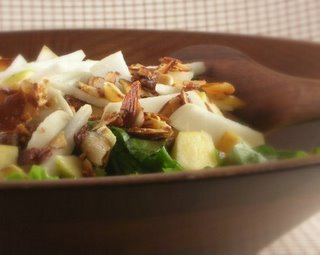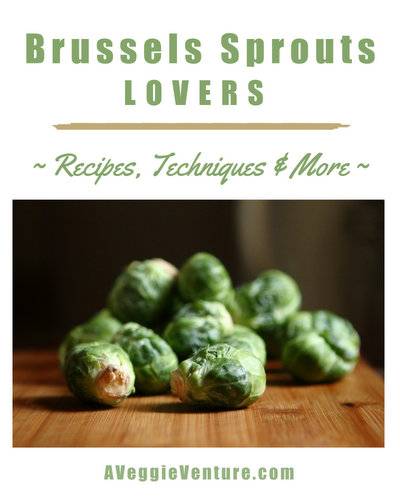Salad with Japanese Turnip ♥
 Meet the kabu, aka the "Japanese turnip" and the "salad turnip" and "turnip hakurei", my new favorite vegetable! (Where is the kabu in the photo? It's the clean white batons atop the salad, along with a lovely heirloom apple called a gold rush, worth seeking out from Centennial Farms in Augusta or elsewhere, and candied almonds.)
Meet the kabu, aka the "Japanese turnip" and the "salad turnip" and "turnip hakurei", my new favorite vegetable! (Where is the kabu in the photo? It's the clean white batons atop the salad, along with a lovely heirloom apple called a gold rush, worth seeking out from Centennial Farms in Augusta or elsewhere, and candied almonds.)The Japanese turnip is gorgeous! The gleaming white flesh is eaten raw. It is dense but not woody or tough, fresh-tasting with no earthiness or bitterness, not sweet, not tart, a tad fruity ... well, like daikon or jicama but not wet, less fibrous. I'm so glad there were several in a bundle, they'll star in salads like this all this week.
COMMUNITY-SUPPORTED AGRICULTURE ... a Good Idea in St. Louis?
I found the gorgeous turnips at the new-this-year farmers market in St. Louis' historic Tower Grove Park at the farmstand for Biver Farms (pronounced bee-ver, like the animal) which is the only CSA farm in the St. Louis area. Last spring, spurred by a frequent source of inspiration and encouraged by an enthusiastic thumbs-up from a friend-of-a-friend who had a Biver CSA in 2005, a friend and I signed up for a subscription ... at least we tried to. Returning phone calls and e-mails is apparently not Biver Farms' strong suit.
Or maybe it's because I mentioned I'd be writing about their vegetables?
 At least one subscriber is not NOT happy with Biver Farms. On Saturday, I learned that turns out, Biver doesn't even really want to do CSAs; they attempt to steer prospective subscribers to the farmers markets, because the selection/choices will be better for the buyers and the markets are a more efficient channel for the farm. But Biver continues to offer CSA subscriptions because the farm relies on (is 'addicted to' is the language used by one of the two owners) what is essentially an interest-free loan that helps meet heavy cash requirements in the spring planting season.
At least one subscriber is not NOT happy with Biver Farms. On Saturday, I learned that turns out, Biver doesn't even really want to do CSAs; they attempt to steer prospective subscribers to the farmers markets, because the selection/choices will be better for the buyers and the markets are a more efficient channel for the farm. But Biver continues to offer CSA subscriptions because the farm relies on (is 'addicted to' is the language used by one of the two owners) what is essentially an interest-free loan that helps meet heavy cash requirements in the spring planting season.The vegetables at the Biver farmstand are extraordinary: fresh, beautifully displayed, unusual. (Remember the radish d'avigon? Gorgeous.) I will buy vegetables from Biver again and again, as soon as Saturday, in fact. But it seems to me that if a spring loan is important to a farm, its summer payments, delivered via bags of vegetables, should be marked 'paid in full'.
Or should they?
I haven't yet done a CSA myself and remain much attracted to the concept. But what are reasonable expectations? And what does make a good CSA? I'd love to know others' experiences and perspectives on Community Supported Agriculture.
SALAD with JAPANESE TURNIP
Hands-on time: 10 minutes
Time to table: 10 minutes
Serves 1
Salad greens dressed homemade vinaigrette (how to make salad dressing)
Japanese turnip, skins on, ends trimmed, cut into batons or diced
Apple, quartered, cored and diced (today, an heirloom called a gold rush which is excellent!)
Candied nuts
(c) Copyright 2006 Kitchen Parade




Looks really pretty!!
ReplyDeleteOkay, Alanna, you've finally one-upped me: I don't think I've come across hakurei (I probably ate it in Japan -- but I haven't cooked with it). Sounds great.
ReplyDeleteAbout the CSA question: as you may know, I was very happy with my CSA share from Wolf Pine Farm here in Maine -- I'm going to be posting an article about the experience soon, now that the season is coming to an end -- and I've been doing some thinking about it.
The situation you describe with Biver Farm is a real conflict-of-interest problem. Wolf Pine Farm sells ALL their produce by CSA share, so it's a true share: what they grow they divide among the shareholders. Good year, big bagsful; bad year, not so big. But if a farm sells some at the farmers' market or other outlets and gives some to the shareholders...well, you can see the problem. I know that if I saw them at the market selling big bunches of beets and my CSA bunches were not so, I'd be wondering what was up...So it's a good idea to ask before you join up exactly where the produce goes each week.
The returning phone calls and emails issue is another concern, but I think there has to be some slack. They're farmers, out in the fields all day, without phones and computers and the time to mess with them all day -- so some slowness or evidence of inexperience should be expected. Nevertheless, a reasonable amount of communication is necessary. Wolf Pine farm returns emails (sometimes slowly, but reasonably so), and they also have a nice website and publish a weekly newsletter, so shareholders can feel like part of the community as well as customers.
Some other issues to think about are washing and handling of the produce. I don't know how they do it but Wolf Pine Farm produce is always at least as clean as the supermarket's, and bunches are in rubber bands, small loose items delivered in bags. When most of your produce is coming from this one source these things are important.
The other issue to try to find out about is the delivery routine. If they offer a pickup point in the city (as Wolf Pine Farm does), are they punctual and organized about it? Is the packaging and handling of the produce conducive to maintaining freshness and good condition?
CSA is a fairly young idea, and a lot of the people doing it are new to farming as well as to marketing and customer service, so kinks should be expected. But some people are working hard to get it right (and ARE getting it right, at least some of the time). The promise of the movement (fresh, interesting, seasonal food on our tables) is great, so let's not give up on it too quickly. I personally am mourning having to go back to the supermarket produce section after next week, when my Wolf Pine Farm share ends for the year.
Sorry for the long comment but I think it's important...and you did ask what we think!
sorry Alanna...Blogger software made me 'anonymous' for that long comment -- I swear I filled in the identity fields for that comment...anyway, 'twas me...
ReplyDeleteAlanna,
ReplyDeleteCSA shares and a good farmer is based on a relationship. My farmer is actively involved in campaigning our state congress for stronger regulations about GME produce. So her time is less focused on the farming. I don't fault her this becuase she equally has a passion for farming and create products to sell such as salad dressing (which is to die for), salad mixes, stir fry mixes, dark greens blend, and salsas (which I am helping her develop).
She keeps a running tab on what produce that a share holder is not so thrilled about and passes those on to people that would adore a bounty of cabbage or apples. She gets to know the likes and dislikes of her share holders so that she can inform them of partnerships she has made with a cheesemaker, goat milker (if that is the word), or a wild herbs gathering.
Yes some weeks I don't hear from her, while others I will get multiple emails in one day. Her website informs you of delivery sites and times for that week. She also lets you know on the website about what special events or items are available.
I look at the groups down in Cali that have newletters and recipes and such, but realize they have a larger staff to do things and my farmer is just her maybe some weeks her kids can come down from the city to help.
After finishing my comment, I realized that I had forgotten to mention that my farmer also does farmers market. At those she sells the products that she has developed primarily while at times she has overstock of produce like corn or yellow squash when in season. My share normally has stuff that is not available to the general public at the farmers market. It's really nice to get stuff that others don't get because they are just going stall to stall.
ReplyDeleteOur pick up location is at market during the summer and the farm during winter and spring shares.
I have never seen one...now I will have to go find one.
ReplyDeleteI am a huge CSA fan, Alanna. It allows farmers more leeway with what they can do when they have an income they can count on and it's so much fun to open that box of produce and find out what you'll be eating each week!
ReplyDeleteOurs have had some organizational issues in the past, but whoever said that they are farmers hit the nail on the head. The skills that make a good grower are not necessarily the skills of an entrepreneur. We just accept that as part of the deal here. And some are better than others at returning calls, and organizing the pickups, etc.
The farmers I know generally prefer to grow for the CSA – it’s a regular customer base and they don’t have to deal with all the marketing issues. Those who do both give the cream of the stuff to the CSA customers who have made the commitment, so the market-goers just get what’s left. We thought we’d be traveling a lot this summer, so didn’t join and I am real sorry about that (especially as we were home the whole time!)
Interesting post!!! (Love the turnip!)
Alanna, your photos are looking rather fabulous these days! ;-)
ReplyDeleteJeff ~ Thanks! The power of a
ReplyDeletelittle learning!
Anonymous-Stephen ~ Of course it's you! Thanks so much for the long and thoughtful answer, Wolf Pine sounds fabulous. I hadn't considered the conflice of interest idea.
ReplyDeleteChrispy ~ You too! Another great farmer.
Peabody ~ That's exactly my reaction last spring. I wanted one too!
Christine ~ Another fan, this is great.
Karina ~ Thank you, dahling ...
My Biver Farm experience has me so angry that I would never buy anything from Biver, no matter how good it looked, because I know that all the left-over, past-their-preak, not-fit-for-prime-time veggies are going to the pre-paying customers. "Interest-free loan" indeed! I feel like punching that guy out!!!!!
ReplyDeleteJan ~ You're wielding the power of the pixel, way more effective than any punch. And given your experience, you should. I'm trying, here, to open a conversation about what we as consumers SHOULD expect ... vs what you've been getting. PS I've got a couple of great recipes for Jerusalem artichokes if you're interested ...
ReplyDeleteHi Alanna,
ReplyDeleteWhat a great discussion you got going. Thanks for letting me know. It's been so crazy, I haven't had a chance to read the blogs much and I am glad I got a chance to put in my 2 cents.
This was my first year participating in a CSA and it was a wonderful experience. Our farm is Brookfield Farm in Amherst, MA and they only do CSA (no farmer's markets). As all experiences go, it came with a few little issues.
What I loved:
-overall the quality was amazing; it's going to be very hard to go back to store bought produce
-the salads in particular were fabulous
-variety of veggies was good. each box usually had 7-10 different veggies in it.
-believe it or not, it was way more convenient than regular shopping. I didn't have to make a shopping list or to wander through the store deciding what to buy, or wait at the check out.
-My farm is located in western mass (2 hours from us), but conveniently delivers 10 minutes from our house. The pick up location stays opened until 8, which works even if I am working late.
-I got to try new veggies (watermelon radish and spring garlic were amazing).
-Our farmers were very responsive by e-mail and phone. They answered all my questions and were great with getting me special orders like zucchini blossoms.
-the price was very competitive for boston area
What could be improved:
-produce was super dirty (not a biggie, but washing took a lot of time)
-sometimes they'd include a tiny bit of some vegetable, like 3 baby beets or 1 tomato. You get inspired to make something, but don't have enough even for 2 portions.
-I am a big zucchini fan, but this was a really bad year for summer squash for them, so we got maybe 4-5 the whole season. If you shop at the farmer's market, you divercify more and if one farmer's crop was wiped out, you can get it at another farm. But it did put me more in touch with the risks and challenges of farmers.
-sometime we got too much of the same vegetable that is not useful in large quantities. For example, it's the 4th week we are getting a bunch of celery and there is only so much celery I can use. On another hand, we didn't get nearly as many herbs as I hoped for. I usually go through 2 bunches a week, and some weeks we got absolutely no herbs, other weeks we got basil for 4 weeks in a row. I guess most people have a little herb garden, but this year I didn't have time to plant anything.
-since it's an organic farm, some veggies can have bugs, worms, etc. I guess it's a good thing -- means the produce is worth eating :) I actually got less squeemish about it as the season progressed.
Would I join a CSA next year? Yes! I might try one closer to home so that we can take advantage of "pick your own." Since our farm was so far, I couldn't make it there even once this summer. But if it wasn't for that, I would stick with Brookfield farm. I loved the experience.
I landed here because I was googling for hakurei turnip recipes since I am a CSA farmer and need to include some ideas on how to use them for my shareholders next week!!! Thanks for the new one. This is a great blog and I could not resist jumping in on the discussion since I've been both a CSA member and farmer over the last couple of years.
ReplyDeleteMy CSA is unique (maybe one of a kind) because I am in rural Minnesota and I provide a winter CSA that runs from mid-October to mid-April. I have a magnificent passive solar greenhouse that produces incredible greens even in the depths of a Minnesota January blizzard.
I subscribe to a summer CSA offered by a neighbor farm and the withdrawl after season's end was the reason I started a winter one. Those hakurei turnips are a terrific addition to the crops I provide. Easy to grow and because their leaves don't have the stiff hairs most turnip leaves do, they can be used as a bitter salad green as well as a steamed or stir fried green. Mmmm.
I read with great interest the comments of folks who have had mixed experiences with CSA farmers, who seem to be earning a rep for being difficult to contact. I'm better than most because my CSA is small. I only have 10 shares (about 15 families) and I still keep my full time job.
But man, I know how the fields can beckon when planting, cultivating or harvesting MUST be done. It's easier for a farmer who has a partner who can help with communications. Usually a farmer gives members a chance at input through a year-end survey (or should). It's a legit complaint, but I know I've done this with my own summer CSA farmer and he's still a goofball when it comes to returning calls and emails--forget about it.
I took this course before I started into this as a producer. It was for beginning farmers in organics and stuff like that. One useful bit I came away with was a lecture about recognizing one's strengths and weaknesses. The supposition was that there's no way one person can be good at everything that's required to run a successful operation. The thing to do is recognize one's pluses and minuses, then find someone who can fill in the gaps.
Farmers are usually up for creative barters with shareholders. You might be able to save yourself some of your upfront share cost if you make a deal with your farmer and show how you can fill in the gaps. He most likely knows he's got 'em. You won't be the first one to say it's impossible to connect when needed.
The other thing with CSA is a matter of competition. In many locations, CSA is a new thing and most of us are grateful to even have one within delivery distance of our home. My hope is that this won't be the case forever and watch those dudes clean up their act when another farmer is willing to step in and do the job better. Cleaner produce, better customer relations--that's what'll keep CSAs in business as the local foods movement expands. In the meantime, I'm still grateful for every delivery of local produce I get. There's no comparison to fresh from the garden.